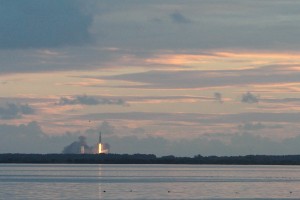Consider how difficult it is to make sure your kitchen stays stocked.
Now imagine if that kitchen was the International Space Station, and it was 220 miles away.
This is a job that SpaceX is tasked with for the fifth time, under a Commercial Resupply Services contract with NASA.
The launch was originally scheduled on Dec. 18, but was pushed back to provide enough time to prepare for the launch.
The launch is currently scheduled to launch at 6:20 a.m. Tuesday, Jan. 6.

Photo by: Nick Russett
The SpaceX Falcon 9 rocket will be carrying a Dragon spacecraft filled with supplies, such as food and water.
In addition to supplies for the ISS, eighteen students will get a second chance at watching their research projects take launch.
The winners of the Student Spaceflight Experiments program took flight back in October, but were lost after the Oct. 28 launch was lost to an explosion.
“I am delighted that most of the students will get to see their investigations re-flown on tomorrow’s SpaceX mission,” said NASA Administrator Charles Bolden, in a Jan. 5 press release. “Perseverance is a critical skill in science and the space business.”`1
In addition to a well timed launch and mission, SpaceX will be attempting their first precision landing of the Falcon 9 rocket. Using their Spaceport Drone Ship, they will attempt to land the Falcon 9 rocket in a reusable condition. This involves controlling and slowing the rocket’s decent back to Earth.
This will be accomplished though a system of engines, parachutes and wings, according to SpaceX.
Check back to KnightNews.com tomorrow for updates on SpaceX’s Cape Canaveral launch.






